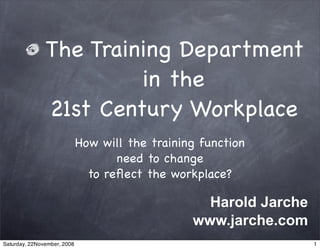training-21-c
- 1. The Training Department in the 21st Century Workplace How will the training function need to change to re’¼éect the workplace? Harold Jarche www.jarche.com Saturday, 22November, 2008 1
- 2. Work The way that we have worked, and what we consider employment, has changed through the centuries Saturday, 22November, 2008 2
- 3. 19th Century The work environment was relatively simple and best practices for management and communications were developed that still inform many of our current work practices. Saturday, 22November, 2008 3
- 4. 20th Century http://’¼éickr.com/photos/brianhendrix/ The information age emerged and organisations had to deal with complicated environments. The ’¼éood of management books is an example that there was no single best practice, only good practices. Saturday, 22November, 2008 4
- 5. 21st Century http://’¼éickr.com/photos/8594424@N07/ Our work environments are becoming complex, blurring the lines between work, home and play. We now have access to anyone at anytime. Saturday, 22November, 2008 5
- 6. Cyne’¼ün Framework ŌĆó Simple - Cause & Effect Obvious ŌĆó Complicated - Cause & Effect needs Analysis ŌĆó Complex - Cause & Effect only seen in Retrospect ŌĆó Chaotic - No Relation between Cause & Effect More info: http://www.cognitive-edge.com/ Saturday, 22November, 2008 6
- 7. Complex Environments Mean that we need to Probe (Act) 19th C. Best Practices Sense Categorize Respond SIMPLE 20th C. Good Practices Sense Analyze Respond COMPLICATED 21st C. Emergent Practices Probe Sense Respond COMPLEX Saturday, 22November, 2008 7
- 8. Indicators of Change ŌĆó Digital tools democratize access to information ŌĆó Hyperlinks subvert hierarchy ŌĆó ItŌĆÖs a ŌĆ£ubiquitously connected & pervasively proximateŌĆØ world ŌĆó Crowd-sourcing ŌĆó Beta releases Saturday, 22November, 2008 8
- 9. Industrial Hierarchy ŌĆ£management knows bestŌĆØ the outside world Management Workers Saturday, 22November, 2008 9
- 10. Networked Reality the outside world Workers the ? ldr wo ou ts de ide tsi Management wo ou rld e th Saturday, 22November, 2008 10
- 11. Wirearchy a new model for work Saturday, 22November, 2008 11
- 12. Wirearchy ŌĆó "a dynamic two-way flow of power and authority based on information, knowledge, trust and credibility, enabled by interconnected people and technology" - Jon Husband http://wirearchy.com/ Saturday, 22November, 2008 12
- 13. First we have to take action: Probe 21st C. Emergent Practices Probe Sense Respond COMPLEX ENVIRONMENT Saturday, 22November, 2008 13
- 14. A New Model for Work & Learning 2) Sense- Management 3) Responding making Information Knowledge & Trust Workers 1) Probing Saturday, 22November, 2008 14
- 15. Probe Sense Respond Saturday, 22November, 2008 15
- 16. Training c. 21st Century Supporting Work in Complex Environments 2) Emergent 3) Tools Practices Connecting Communicating 1) Collaborative Work/Learning Saturday, 22November, 2008 16
- 17. How do I start? Saturday, 22November, 2008 17
- 18. Be an active & continuous learner Be a lurker (passive participant) LISTEN Communicate what you observe Continuously collect feedback, not just after courses Make it easy to share information by simplifying & synthesizing Use Web Networks as research tools Saturday, 22November, 2008 18
- 19. Cartoons: gapingvoid.com Contact: harold@jarche.com Saturday, 22November, 2008 19



















